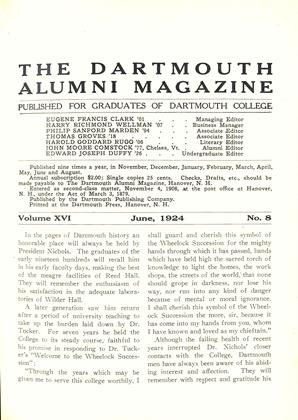The first of the after-dinner speakers was Lewis Parkhurst '78 of the Board of Trustees, who spoke on the subject "What are the Trustees Doing?" His address was heard with the greatest interest and we are fortunate in being able to present it elsewhere in this magazine for the benefit of a larger audience.
Dartmouth From the Village Rectory—John T. Dallas.
The second speaker was one who has made for himself his own special place in the hearts of Dartmouth men. Dr. Dallas was able to speak in one sense as an outsider but in another sense as one who is brought close to the currents of undergraduate life. He emphasized the similarity between the work of a college secretary and the work of a pastor of his flock and stressed the point that in the hands of the secretaries to a ver\- large degree rests the future of Dartmouth College. The alumni of all colleges are likely to have only a sentimental feeling toward the college of their formative days. This may apply to the groups represented by the secretaries and these groups may therefore not be able to impress the world with a clear idea of just what Dartmouth stands for. If the secretaries can get back to the members of the classes the real spirit of the institution and the men who are directing it there need be no worry about the future of Dartmouth.
Among the characteristics of the present undergraduate bodj- Dr. Dallas referred to the fine spirit of sportsmanship prevalent and the large group of idealists. These men have great dreams about the college in literature and science and the speaker expressed it as his opinion that there are more men today dreaming of what Dartmouth ought to be than ever before in the history of the College. Some of the students want to go into politics, some into professions, some into education, and some into the church, because they have got the spirit of the place. They wish to take this-'spirit out into a hungry land where there is plenty of room for dream ideals, zest for fair play, and honest sportsmanship. Dr. Dallas considered these ideals and youthful enthusiasms more evident at Dartmouth than at any other college in the country and he closed with a fervent appeal to spread this youthful idealism more and more into the groups represented by the secretaries. The College—Craven Laycock '96.
In speaking for the President, Dean Laycock took the opportunity first of all to welcome the secretaries to Hanover and to the College. He also referred feelingly to the unusual service to the College which both of the previous speakers had and were rendering. Among the subjects that the Dean presented were the Chicago Pow Wow with its very great contribution to the spirit of the alumni body, the sophomore-freshman controversy over the picture fight which was then in progress, and a general discussion of some of the problems that were engrossing the undergraduate mind. He referred to the educational investigation through various groups interested in the College and deplored criticism of this investigation since nothing but good would be possible from a fair consideration and inquiry into college policies. He also discussed briefly the more recent developments in the selective process.
The Dean closed his address with a feeling reference to an incident in the administration of former President Nichols: "The College for those of us who are on the ground all the time has its constant periods of dejection and inspiration. In my early days of service I frequently became discouraged and once went to President Nichols in my perlexity. I said to him, 'I want you- to accept my resignation. I can't stand the gaff. I have been talking to ne'er-do-wells for two weeks trying to put inspiration into them.' He turned to me and said one of the wisest things that man has ever said,—'Laycock, I do not believe that any man will ever stay on his job if he measures all of the time from the bottom of the stick. The only way' you can live through it all is to measure from the top.' It was a wonderful saying to me and from that day I learned to measure from the top. Nine- teen hundred men doing their best and working as one man with another overshadow the fact that there is a bottom to the stick. When you are working with large numbers in whom the greatest ambitions of life can be started from a spark of your spirit then you are encouraged to enter your work with a zest in the hope that some of the seed will fall on fertile grouted. Such are the possibilities in an institution of this nature."
This concluded the speaking of the evening. The secretaries were invited to Tuck Hall for a short session of moving pictures. Some of the recent films of the Outing Club were shown as well as a few reels of the official picture of the class of 1922, introduced and explained by Robert P. Booth, former secretary of that class.
 View Full Issue
View Full Issue
More From This Issue
-
 Article
ArticleWHAT ARE THE TRUSTEES DOING?
June 1924 By Lewis Parkhurst '78 -
 Article
ArticleMATERIES MEDICI
June 1924 By Edwin J. Bartlett '72 -
 Article
ArticleSaturday Morning Session
June 1924 -
 Article
ArticleANNUAL MEETING OF THE SECRETARIES
June 1924 -
 Article
ArticleThe Responsibility of the College to its Alumni
June 1924 By P. S. M. -
 Class Notes
Class NotesCLASS OF 1903
June 1924 By Perley E. Whelden








